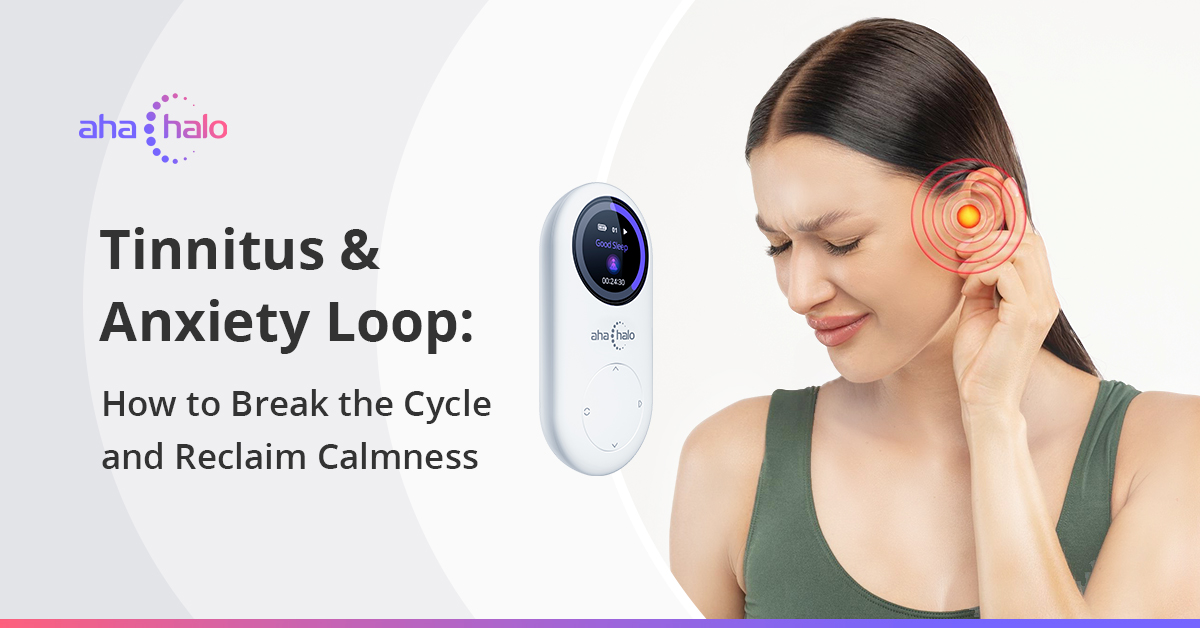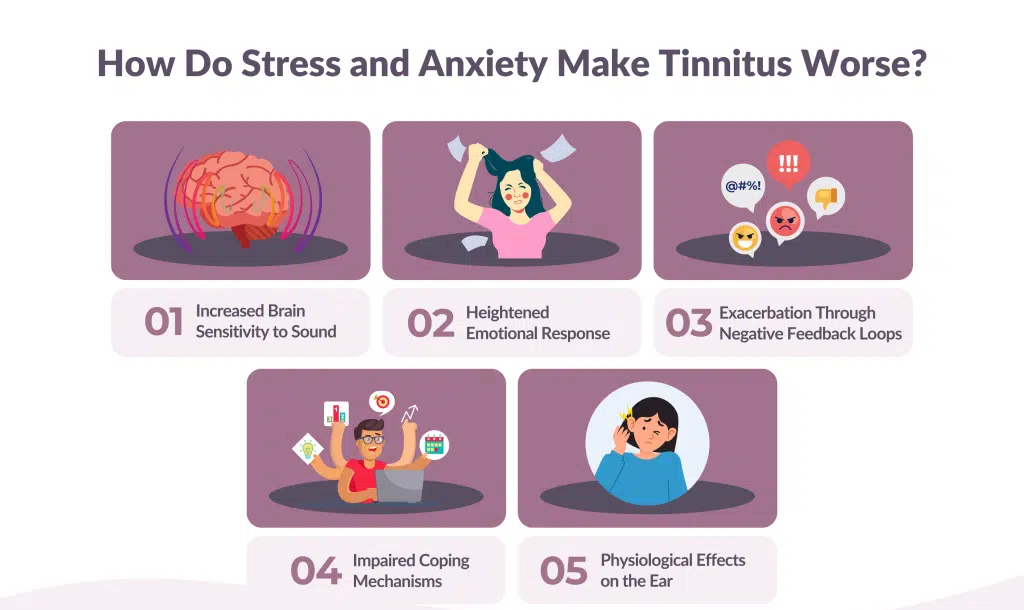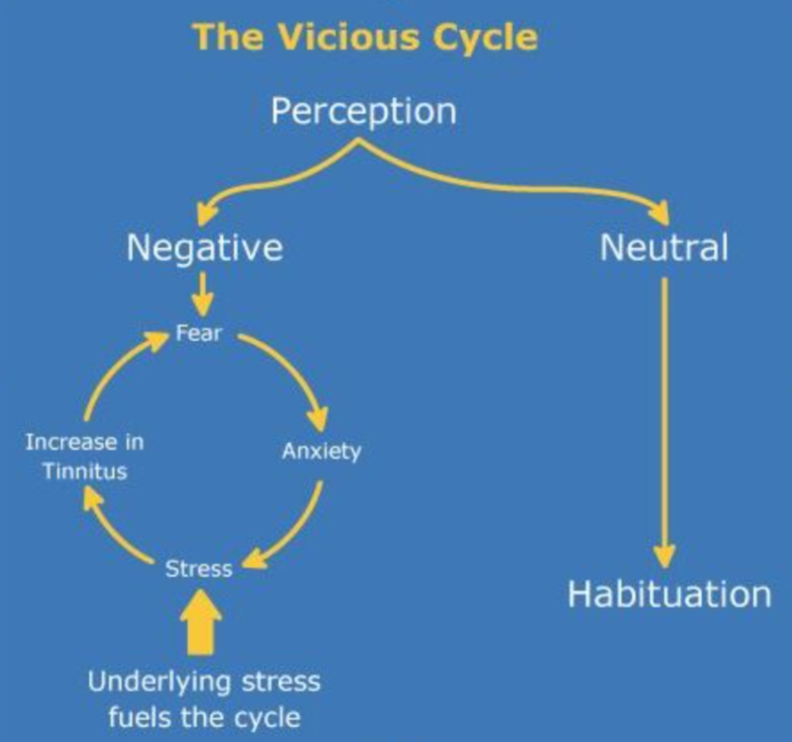Tinnitus & Anxiety Loop: How To Break The Cycle And Reclaim Calmness

Imagine settling into bed after a long day. The house is still, and the outside world is quiet, but in the silence, a persistent sound exists—a hiss, a hum, or a high-pitched whistle that’s only audible to you. This is the reality for people with tinnitus. For millions, this isn't just an auditory issue but a constant emotional intruder, which can lead to frustration, exhaustion, and often, it can quietly pull a person into a relentless anxiety cycle.
Tinnitus and anxiety often act like a feedback loop where the presence of one amplifies the other. Today, we’ll delve into the neurological basis of this "vicious cycle" and provide you with clear strategies and supportive tools to help your brain disengage from this unending "alarm."
More Than Just A Sound: Why Tinnitus Triggers Anxiety
The reason tinnitus can cause such profound emotional distress is that your brain interprets this "phantom sound" as a potential threat to survival.
The Brain's "Threat Alarm"
When tinnitus occurs, it activates parts of the brain associated with emotion, memory, and survival instincts: the limbic system.

Because this sound is constant and unpredictable, your brain can flag it as a permanent "danger signal," triggering the "fight or flight" response. In turn, your body would continuously release stress like cortisol.
A State Of Hypervigilance
You become overly sensitive to your surroundings and your own bodily sensations, leaving your nerves on edge. However, the core issue is not the sound itself, but rather the brain's fearful and aversive reaction to the sound.
How Emotion Makes Tinnitus "Louder": Anxiety's Magnifying Glass
Unfortunately, the anxiety triggered by tinnitus doesn't help it subside. Instead, it acts as a magnifying glass, making the sound seem more prominent and unbearable.
How The Vicious Cycle’s Forged
Physiological Feedback: Persistent anxiety leads to muscle tension, particularly in the neck, jaw, and around the ears, and these physical tightness can sometimes mechanically intensify the perception of tinnitus.
Attentional Focus: Anxiety drives the brain to "scan for threats." The more you fear the tinnitus, the more your attention becomes locked onto it. This hyper-focus makes the sound subjectively louder and more intrusive.

How The Loop Reinforces Itself
As the sound is amplified, the brain's "threat alarm" is confirmed, which deepens anxiety, and it creates a self-perpetuating loop of tinnitus, anxiety, intensified tinnitus. The key to breaking this cycle lies in severing the neurological link between the "sound" and the "emotional reaction."

Strategies To Break The Cycle: Training The Brain To Stand Down
Our goal is not necessarily to make the tinnitus disappear (which is often difficult), but to teach the brain to ignore it. We want to reclassify it from a "threat" to "meaningless background noise", and this process is known as habituation.
Effective "Noise-Canceling" Methods For Your Mind
Auditory Enrichment (Sound Therapy): Use gentle, soothing background sounds (like white noise, nature sounds, or a fan) to enrich the auditory environment, which gives the brain other sounds to focus on, making the tinnitus less prominent.
Mindfulness And Attention Shifting: Deliberately shift your focus away from the tinnitus and onto your physical sensations, your breath, or the world around you, which is a powerful way to train your brain and tell it that the sound is unimportant.
Relaxation Techniques: Use deep breathing, meditation, and gentle stretching to directly combat it and lower the body's stress response levels.
Aha Halo: Finding Calm In The Frequency Field
Integrating the Aha Halo into your daily routine can be a powerful way to support your journey of breaking this cycle and achieving habituation. Our programs are designed to offer gentle, systemic support from two key angles: auditory perception and emotional stability.
Ear Noise: This program is specifically designed to support auditory health and help the brain to better adapt to and habituate persistent sounds. We recommend using it in a quiet environment when your tinnitus is most noticeable to help support your brain's retraining process.
Solfeggio: These pure frequencies are believed to resonate with the body's energy centers, helping to promote deep relaxation and coherence, which can provide an ideal energetic backdrop for your daily relaxation or meditation practices and release some stressful feeling when tinnitus arises.
Relaxation I: This program is designed to "gently support daily tension, guiding the mind and body toward a calm baseline." When you feel the weight of daily stress and nervous tension, this program is an excellent starting point.
Relaxation II: For those moments when the currents of daily stress feel a bit deeper, or when emotional waves are more pronounced, we suggest exploring the Relaxation II program, designed to help you manage these emotional fluctuations and supporting you in gradually building a more stable inner resilience. This is a form of gentle, internal support, and we believe that everyone has the capacity to find their inner calm.
Consistency and Integration: Please remember that breaking a cycle that has been active for years takes time. So please be patient with yourself, and consistent, regular use of the programs combined with a healthy routine and positive lifestyle choices is the key to achieving lasting results.

The Path To Peace
Ultimately, the challenge of tinnitus is a test of your ability to manage your relationship with your own thoughts and emotions as you don't need to fight the sound, simply need to stop reacting to it as a threat. Through conscious practice and supportive tools like Aha Halo, you can intentionally teach your brain to let that persistent "alarm" fade into the background of your life.
Starting today, actively choose peace over anxiety. Welcome to share your tinnitus journey or any useful tricks for your brain to tune out tinnitus or make it stop in the comments or in the FB group.



